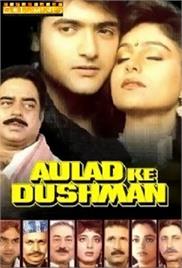Be Careful of Fake Websites. Always use HindiMovies.to domain & Join our Telegram Channel for Latest Updates.

Likes: 6
Views: 2.02K
Aulad Ke Dushman is a story of parents who blindly bow down to the demands of their stubborn children thereby adding poison to their future. R. K. Chaudhary is the father believes in fulfilling every whim of his son Vicky to express his love towards him. When Vicky commits a murder, Chaudhary blankets his crime by pouring money. When Vicky insults the vice principal of his college, Chaudhary forces the Vice Principal resign instead of questioning Vicky. Chaudhary’s elder brother Papaji does not approve of Vicky’s misbehavior and leaves the house. Shalu, the daughter of Chaudhary’s friend Kumar is engaged to Vicky in the very childhood. She loves Vicky but Vicky loves Chanda. Vicky refuses to marry Shalu and marries Chanda. Dindayal takes advantage of the situation and grabs the entire estate of Chaudhary and Chanda drives Vicky out. R K Chaudhary and Vicky become paupers. Kumar creates hurdles in Vicky’s path, makes his efforts futile. Vicky drops in the party thrown by Kumar at his place for the engagement ceremony of Shalu and Sailesh, and demands his estate at the gun-point. However Papaji appears on the scene and decalres that this was pre-planned by him and Dindayal for reforming his nephew. In the meantime, Sailesh and his father kidnap Chanda. Chanda is freed in the end and she gives the hand of Shalu in the hand of Vicky and leaves for London with her father Dindayal.
Released: 1993
IMDb Rating: 3.8/10 (24 Votes)
Genre: Drama, Hindi Movies
Stars: Harbans Darshan M Arora, Kishore Anand Bhanushali, Raj Babbar, Vikas Anand
Directors: Rajkumar Kohli
Writers: Lalit Mahajan
Year: 1993
Server 1 – Youtube
Aulad Ke Dushman (1993): A Deep Dive into the Drama
Introduction:
Aulad Ke Dushman is a compelling Hindi drama film released in the year 1993. Set against the backdrop of complex family relationships and emotional turmoil, the movie offers a glimpse into the challenges and conflicts that arise between parents and their children. The film is known for its intense storyline, powerful performances, and portrayal of societal and familial dilemmas that resonate with many viewers.
Plot Summary:
The narrative of Aulad Ke Dushman centers around the strained relationship between parents and their offspring. The story explores themes of misunderstanding, betrayal, sacrifice, and ultimately, reconciliation. Although the storyline details are not extensively documented, the essence of the film lies in the emotional conflicts between the characters, emphasizing how trust and love can be tested within a family.
The drama unfolds as the family faces internal and external struggles that challenge their unity. The title, which translates to "Enemies of Children," metaphorically touches upon how circumstances and choices can make even the closest bonds sour. It highlights the idea that sometimes, the very people meant to support become the source of pain and adversity.
Director and Writer:
The film is directed by Harbans Darshan M. Arora, who has contributed his vision and directorial expertise to mold the story into an engaging cinematic experience. The writer behind the screenplay and dialogues is Vikas Anand. Both have played pivotal roles in crafting the narrative's emotional depth and drama, delivering a film that artfully captures the nuances of familial relationships in India.
Main Actors and Their Roles:
Aulad Ke Dushman features a cast of talented actors known for their work in the Hindi film industry. Among the main cast is Vikas Anand, who is not only the writer but also appears in the film, showcasing his versatility. Alongside him are other actors, though specific details about the full cast are brief. Nevertheless, the performances contribute significantly to the intensity and sincerity of the film.
Music and Songs:
As a Bollywood drama from the early 1990s, music plays an integral role in Aulad Ke Dushman. While this film may not be as widely known for its musical score compared to mainstream productions of the time, the songs complement the emotional currents in the storyline. The soundtrack typically features melodies that underscore the themes of love, pain, and redemption.
Unfortunately, detailed information about the specific songs and singers in this movie is limited. The film's music reflects the mood of the era, with compositions that align with the dramatic elements portrayed on screen.
Genre and Style:
The film falls primarily within the drama genre, characteristic of many Indian family-centric movies. It combines emotional intensity, powerful character dynamics, and social commentary that is often reflective of Indian society. The storytelling style involves traditional narrative techniques, dialogue-driven scenes, and moments crafted to evoke empathy and reflection.
Impact and Reception:
Although Aulad Ke Dushman might not be among the most widely acclaimed or celebrated films in Indian cinema, its significance lies in its portrayal of troubled family relationships and moral dilemmas. Films like this contribute to the tapestry of Bollywood, representing the practical realities and heartfelt stories that many viewers relate to. It remains a notable work for those interested in exploring Hindi drama cinema from the early 1990s.
Conclusion:
In conclusion, Aulad Ke Dushman (1993) stands as a poignant example of Bollywood’s engagement with intricate family dynamics. Directed by Harbans Darshan M. Arora and written by Vikas Anand, the film delves into the emotional struggles that arise when love meets misunderstanding. Through its performances, narrative, and music, it captures the essence of human relationships challenged by circumstances. For those passionate about Hindi drama films, this movie offers a reflective and heartfelt journey into the complexities of parent-child bonds.